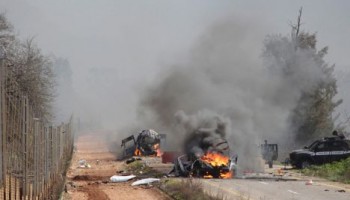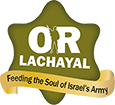Two Israeli soldiers were killed and seven wounded on Wednesday morning, after an anti-tank missile struck an Israel Defense Forces vehicle in the Har Dov area near the Lebanon border, as mortar shells were fired at nearby areas.

The wounded IDF troops were being treated at the Sieff Hospital in Safed and the Rambam Hospital in Haifa. Three suffered light to moderate wounds, and the rest were lightly wounded. The IDF said that no soldier had been kidnapped, despite earlier reports.
Despite the high alert in recent days, following the unconfirmed Israeli strike in Syria, the soldiers were driving in an unarmored vehicle on the Lebanon border when they were ambushed.
IDF forces responded with artilley fire, shelling several targets in southern Lebanon. A Spanish UNIFIL soldier was killed in the strikes. According to El-Mundo, the soldier is Francisco Javier Soria Toledo, 36, from Malaga, married without children.
Foreign Minister Avigdor Lieberman called his Spanish counterpart to convey Israel’s condolences for the death of the Spanish soldier, and said Hezbollah is to blame for the attack, and that Israel considers the Lebanese government responsible for any attack out of its territory.
Lieberman, who was meeting with China’s foreign minister in Beijing, said Israel should respond in a “forceful and disproportionate manner” to the events, in the way that the U.S. or China would respond to similar events. He told his Chinese counterpart that he expects Israel to receive support from her friends in the world for such a response.
Zionist Camp co-chair MK Tzipi Livni said during a tour of the northern border that Israel will respond “harshly” to Hezbollah’s attack.
One of the mortar shells fired from Lebanon struck a home in Ghajar, a village which straddles the border, setting the structure alight. The mortar fire continued into the afternoon, aimed at the Hermon region. Hezbollah claimed responsibility for all of the attacks.
The IDF responded by shelling targets in southern Lebanon. Lebanese media quoted security officials as saying that Israel has fired at least 25 artillery shells into Lebanese territory. The officials said the shelling targeted the border villages of Majidiyeh, Abbasiyeh and Kfar Chouba near the Shebaa Farms area, according to Lebanese media.
A spokesman for UNIFIL, the UN peacekeeping force deployed in south Lebanon since 1978, said the UN is looking into the circumstances of the incident in which one of the force’s soliders was killed. He did not disclose the nationality of the soldier, but local media reports said he was a Spanish national.
The IDF warned that its response would only escalate if the attacks did. IDF spokesman Moti Almoz said the military views Hezbollah as responsible for the attacks, and said the IDF’s shelling of targets in south Lebanon “would not necessarily be the final response to this incident.”
The attacks took place as Prime Minister Benjamin Netanyahu was in the southern city of Sderot, laying the cornerstone for a new neighborhood. “At these moments, the IDF is responding to the events in the north. Look what happened here. Not far from the city of Sderot, in Gaza, Hamas was hit by the strongest blow it ever received last summer… Security comes before all else. Security is the foundation for everything.”

Israeli soldiers treat their comrades (AFP)
Netanyahu cut short his visit to Sderot and joined Defense Minister Moshe Ya’alon for a security briefing in the Defense Ministry headquarters in Tel Aviv.
Residents in the northern city of Metula and the surrounding kibbutzim were instructed to remain indoors. The airports in Rosh Pina and Haifa suspended operations amid the ongoing fire.
The incident occured shortly after it emerged that IDF troops were digging in the same area search for possible Hezbollah tunnels. There was no apparent connection between the two incidents.

Hours earlier, the IDF launched a strike on Syrian Army artillery posts in retaliation for the four rockets fired Tuesday at Israeli territory, two of which exploded in the Golan Heights. Ya’alon said that areas targeted by the IDF in Syria were under control of Syrian President Bashar Assad’s regime.
Israeli artillery scored direct hits on Syrian targets in the Quneitra province, according to a statement released by the Israel Defense Forces’ spokesperson: “The IDF holds the Syrian government accountable for all attacks emanating from its land, and will operate by any means necessary to defend Israeli civilians. Such blatant breaches of Israeli sovereignty will not be tolerated,” the army statement read.
A rocket alert siren sounded in the Golan Heights before the Israeli strike, though the IDF said no rockets landed in Israeli-controlled territory.
Groups in the Syrian opposition said Wednesday morning that the overnight Israeli strikes targeted two bases belonging to the Syrian military in the Quneitra region, and one near the Damascus international airport.
Lebanon criticizes Israel
Arab League Chief Nabil al-Arabi asked the UN Security Council to intervene in Lebanon to prevent deterioration in situation.
Lebanon’s prime minister said Lebanon is committed to a UN resolution that ended a war between Israel and Hezbollah in 2006, and criticized Israel for causing an escalation in tensions.
“Lebanon reaffirms its commitment to Security Council resolution 1701,” Tammam Salam said in a statement published on Lebanon’s National News Agency.
Lebanese politician Samir Geagea slammed Hezbollah’s attack, saying the group has “no right to involve the Lebanese army and government in a battle with Israel,” the Lebanese Naharnet reported. Geagea is the leader of the Christian party, Lebanese Forces, which is part of the March 14 Alliance which opposes Hezbollah.
Another Lebanese politician, Walid Jumblatt, warned that the rising tensions mean Lebanon will “enter a major turbulent phase,” and accused Netanyahu of trying to score political points through the Israeli airstrike on the Quneitra region last week. Jumblatt is the leader of the Druze Progressive Socialist Party, formerly affiliated with the March 14 Alliance, but currently siding with Hezbollah on the Syria Civil War.
 English
English עברית
עברית
